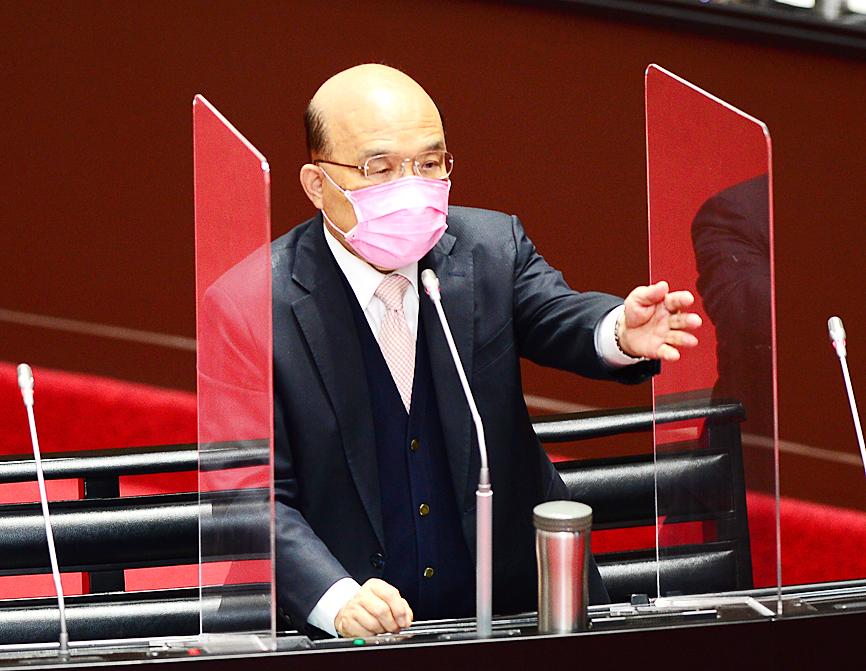Premier Su Tseng-chang (蘇貞昌) and other top Democratic Progressive Party (DPP) officials yesterday condemned Beijing after it announced that they had been placed on a no-entry list and would be subject to further sanctions.
China’s Taiwan Affairs Office spokeswoman Zhu Fenglian (朱鳳蓮) said that Taiwanese independence advocates and their family members would face life-long legal consequences should they set foot in China, including Hong Kong and Macau, or conduct business with entities there.
It was the first time China announced concrete sanctions against who it calls supporters of Taiwanese independence.

Photo: Wang Yi-sung, Taipei Times
The office named Su, Legislative Speaker You Si-kun (游錫堃) and Minister of Foreign Affairs Joseph Wu (吳釗燮) as part of “an extremely small minority of diehard Taiwanese separatists who caused extreme harm ... to the fundamental interests of the Chinese race.”
China would also take “any other necessary measures” against these people, Zhu said.
She said that the message China wants to send to supporters of Taiwanese independence is: “Those who forget their ancestors, betray the motherland and split the country will never end up well and will be spurned by the people and judged by history.”
During a plenary session at the legislature, DPP Legislator Chen Ting-fei (陳亭妃) asked Su to comment on the news before congratulating him for being a “Beijing-certified Taiwanese patriot.”
Su replied: “These foreigners are meddling in Taiwan’s domestic affairs. I fight for Taiwan and I will not give in to intimidation for doing the right thing.”
Separately, You said: “China’s Xinhua news agency is yet again raising my international recognition, and I must say I am quite proud of it; Miss Zhu has my sincere thanks.”
“However, I have no plans to run for office and she should not trouble herself with me,” he added.
China last year said it was compiling a global watch list of Taiwanese independence supporters, adding that those on the list would be punished.
The sanctions announced yesterday are likely to have little effect on the Taiwanese politicians, as they are unlikely to travel to China.
China has ratcheted up military, economic and diplomatic pressure on Taiwan since President Tsai Ing-wen (蔡英文) took office in 2016 after a campaign many understood to be in support of Taiwanese independence.
Additional reporting by Bloomberg

INVESTIGATION: The case is the latest instance of a DPP figure being implicated in an espionage network accused of allegedly leaking information to Chinese intelligence Democratic Progressive Party (DPP) member Ho Jen-chieh (何仁傑) was detained and held incommunicado yesterday on suspicion of spying for China during his tenure as assistant to then-minister of foreign affairs Joseph Wu (吳釗燮). The Taipei District Prosecutors’ Office said Ho was implicated during its investigation into alleged spying activities by former Presidential Office consultant Wu Shang-yu (吳尚雨). Prosecutors said there is reason to believe Ho breached the National Security Act (國家安全法) by leaking classified Ministry of Foreign Affairs information to Chinese intelligence. Following interrogation, prosecutors petitioned the Taipei District Court to detain Ho, citing concerns over potential collusion or tampering of evidence. The

‘FORM OF PROTEST’: The German Institute Taipei said it was ‘shocked’ to see Nazi symbolism used in connection with political aims as it condemned the incident Sung Chien-liang (宋建樑), who led efforts to recall Democratic Progressive Party (DPP) Legislator Lee Kun-cheng (李坤城), was released on bail of NT$80,000 yesterday amid an outcry over a Nazi armband he wore to questioning the night before. Sung arrived at the New Taipei City District Prosecutors’ Office for questioning in a recall petition forgery case on Tuesday night wearing a red armband bearing a swastika, carrying a copy of Adolf Hitler’s Mein Kampf and giving a Nazi salute. Sung left the building at 1:15am without the armband and apparently covering the book with a coat. This is a serious international scandal and Chinese

Seventy percent of middle and elementary schools now conduct English classes entirely in English, the Ministry of Education said, as it encourages schools nationwide to adopt this practice Minister of Education (MOE) Cheng Ying-yao (鄭英耀) is scheduled to present a report on the government’s bilingual education policy to the Legislative Yuan’s Education and Culture Committee today. The report would outline strategies aimed at expanding access to education, reducing regional disparities and improving talent cultivation. Implementation of bilingual education policies has varied across local governments, occasionally drawing public criticism. For example, some schools have required teachers of non-English subjects to pass English proficiency

TRADE: The premier pledged safeguards on ‘Made in Taiwan’ labeling, anti-dumping measures and stricter export controls to strengthen its position in trade talks Products labeled “made in Taiwan” must be genuinely made in Taiwan, Premier Cho Jung-tai (卓榮泰) said yesterday, vowing to enforce strict safeguards against “origin laundering” and initiate anti-dumping investigations to prevent China dumping its products in Taiwan. Cho made the remarks in a discussion session with representatives from industries in Kaohsiung. In response to the US government’s recent announcement of “reciprocal” tariffs on its trading partners, President William Lai (賴清德) and Cho last week began a series of consultations with industry leaders nationwide to gather feedback and address concerns. Taiwanese and US officials held a videoconference on Friday evening to discuss the